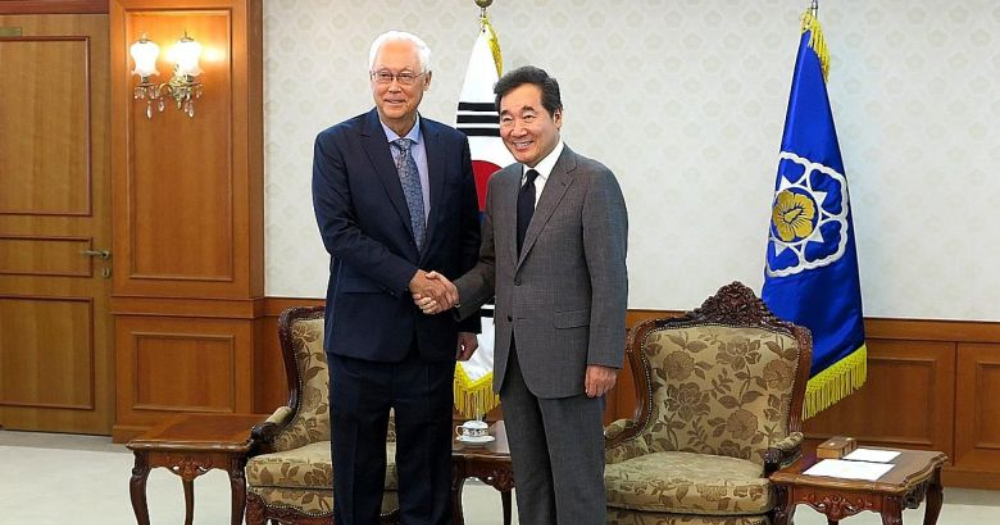Asia must take action to encourage both China and the United States that currently embroiled in a trade dispute to work towards a position of both competition and cooperation, said Emeritus Senior Minister Goh Chok Tong.
The world is big enough for both superpowers to coexist
His comments were part of a keynote speech given at the official dinner of South Korean newspaper Chosun Ilbo's 10th Asian Leadership Conference on Tuesday, May 14.
According to a transcript of the speech on Singapore's Ministry of Foreign Affairs' (MFA) website, Goh said should both superpowers be "partners and rivals", or "frenemies", the chance for an open conflict would be lower.This is the best out of the three scenarios that he gave.
The other two were an "existential conflict" and "unbridled strategic conflict but in accordance with some global rules".
Goh added that both the Asia Pacific and the world are big enough to accommodate both superpowers, which was something the leaders of both sides have said before.
Asia should be a "Moderate Voice"
And it would be in the interests of smaller countries to band together to be a "Moderate Voice".
The countries that should take part in this are the Asean member countries, South Korea, Japan, India, Australia and New Zealand, he said.
Clarifying that it is "not a bloc or new grouping", Goh said these countries would simply be the "voice of moderation".
Many countries in Asia that are caught in the middle of the rivalry between the two superpowers have already experienced the impact of the trade dispute, he said.
Nevertheless, they can play a role in helping both China and the U.S. to consider the interests of global peace and stability.
Goh said they could do this by:
- Understanding both countries well, and not take sides
- Welcome China's peaceful and non-hegemonic rise", and encourage China to play a greater constructive regional and global role
- Reiterate Asia's continued welcome of the US' presence in the region, which would help maintain regional peace and stability
Goh further suggested ways for the "Moderate Voice" to work together.
These include looking past history that holds progress back, holding regular retreats among leaders to build mutual trust, as well as strengthening multilateral institutions and concluding negotiations for trade agreements, such as the Regional Comprehensive Economic Partnership (RCEP).
Rise above the grass that's under the elephants
Goh then said that while realpolitik is "not so simple", other countries caught in the fray should still maintain their ideals while being realistic.
And by exercising their influence as the "Moderate Voice" while still being friends of both China and the U.S., these countries can remain independent and neutral in the rivalry between them.
He ended his speech by giving an "Asian" twist to the well-known African proverb of "When elephants fight, the grass beneath them suffers":
"When elephants make love, the grass beneath them also suffers.
We should avoid being the grass beneath the elephants, and choose to be a Voice of Moderation that even the elephants will pay attention to."
In other words, rather than give in to the collateral damage dealt by the trade dispute, smaller countries should stand against such behaviour collectively, and encourage better relations between the two superpowers.
Trump & Xi due to meet in Japan next month
Goh's remarks come after the U.S.-China trade dispute escalated when China retaliated on May 13 against the tariffs imposed by the U.S. on Chinese goods, by slapping tariffs of its own on American goods.
The latest development broke the five-month truce that Chinese President Xi Jinping and the U.S. President Donald Trump brokered in December 2018.
Nevertheless, both leaders are scheduled to meet next month in Osaka, Japan, at the 2019 G20 Summit.
Trade and Industry Minister Chan Chun Sing has also expressed his hope for both China and the U.S. to be able to put an end to the dispute, as a stable and rules-based global trading environment is vital to Singapore's growth.
Top image via Ministry of Foreign Affairs
If you like what you read, follow us on Facebook, Instagram, Twitter and Telegram to get the latest updates.
